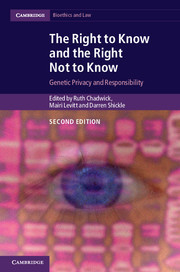The Right to Know and the Right Not to Know (2nd Ed.) Genetic Privacy and Responsibility Cambridge Bioethics and Law Series
Langue : Anglais
Coordonnateurs : Chadwick Ruth, Levitt Mairi, Shickle Darren

This book re-examines privacy in a world where genome sequencing is cheap, databases can be large, and access rights are hidden.
The privacy concerns discussed in the 1990s in relation to the New Genetics failed to anticipate the relevant issues for individuals, families, geneticists and society. Consumers, for example, can now buy their personal genetic information and share it online. The challenges facing genetic privacy have evolved as new biotechnologies have developed, and personal privacy is increasingly challenged by the irrepressible flow of electronic data between the personal and public spheres and by surveillance for terrorism and security risks. This book considers the right to know and the right not to know about your own and others' genomes. It discusses new privacy concerns and developments in ethical thinking, with the greater emphasis on solidarity and equity. The multidisciplinary approach covers current topics such as biobanks and forensic databases, DIY testing, group rights and accountability, the food we eat and the role of the press and the new digital media.
Introduction: the right to know and the right not to know: seventeen years on Darren Shickle; Part I. Philosophical and Legal Issues: 1. The philosophy of the right to know and the right not to know Ruth Chadwick; 2. Autonomy Jorgen Husted; 3. Privacy and the right not to know: a plea for conceptual clarity Graeme Laurie; Part II. Issues in Genetics: 4. Biobanks and feedback: the right to know what other people know Kadri Simm; 5. Suspects, victims and others: producing and sharing forensic genetic knowledge Robin Williams and Matthias Weinroth; 6. Empowered by choice? Mairi Levitt; 7. DIY: the right to know your own genome Barbara Prainsack; 8. Genomics, inconvenient truths, and accountability Jeantine Lunshof and Ruth Chadwick; Part III. Emerging Issues: 9. The right to know and the right not to know in the era of neoliberal biopolitics and bioeconomy Henk ten Have; 10. The parental love argument against 'designing' babies: the harm in knowing that one has been selected or enhanced Anca Gheaus; 11. The inescapability of knowing and inability to not know in the digital society Richard Watermeyer; 12. The press and the public interest Joachim Allgaier; 13. The food we eat: the right to be informed and the duty to inform Michiel Korthals.
Ruth Chadwick is Professor of Bioethics at Manchester University and chair of the Human Genome Organisation (HUGO) Committee on Ethics Law and Society. She directed the ESRC Centre for Economic and Social Aspects of Genomics (Cesagen) from 2002 to 2013.
Mairi Levitt is a senior lecturer in the Department of Politics, Philosophy and Religion at Lancaster University, where she works in empirical bioethics and researches ethical and social issues in genetics.
Darren Shickle is Professor of Public Health at the University of Leeds, where his research interests include public health ethics, public health genetics, ophthalmic public health and HIV and sexual health.
Mairi Levitt is a senior lecturer in the Department of Politics, Philosophy and Religion at Lancaster University, where she works in empirical bioethics and researches ethical and social issues in genetics.
Darren Shickle is Professor of Public Health at the University of Leeds, where his research interests include public health ethics, public health genetics, ophthalmic public health and HIV and sexual health.
Date de parution : 09-2014
Ouvrage de 228 p.
15.2x22.6 cm
Date de parution : 09-2014
Ouvrage de 232 p.
15.2x22.9 cm
Disponible chez l'éditeur (délai d'approvisionnement : 14 jours).
Prix indicatif 83,44 €
Ajouter au panierThème de The Right to Know and the Right Not to Know :
© 2024 LAVOISIER S.A.S.
